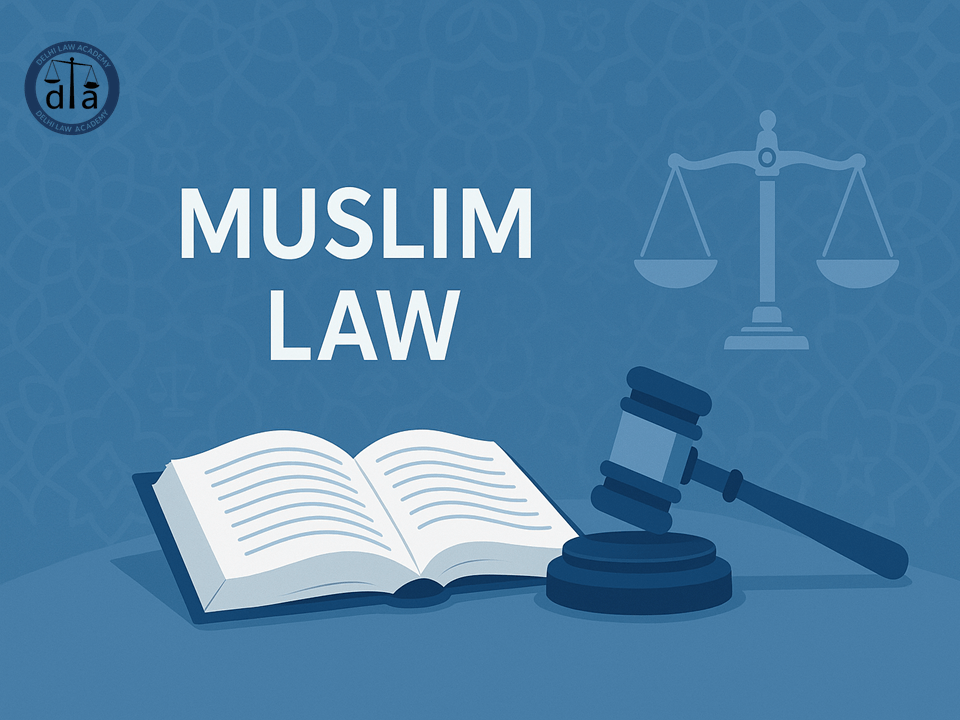
⚖️ Preparation for RJS, DJS, PCS (J) and other Judicial Service exams
Question:
• Whether a marriage by a Muslim with his wife’s sister, while his earlier marriage was still subsisting, would be void or merely irregular or voidable?
CHAND PATEL v. BISMILLAH BEGUM [2008 SC]
• The bar of unlawful conjunction (jama bain-al-mahramain) renders a marriage irregular and not void.
• Under the Hanafi law as far as Muslims in India are concerned, an irregular marriage continues to subsist till terminated in accordance with law and the wife and the children of such marriage would be entitled to maintenance under Section 125.
****************
Muslim Law is an important component of most Judicial Service exams in the country. Its thorough knowledge is a must for all aspirants of RJS, DJS, PCS (J) and other Judicial Service exams. To help such aspirants, DELHI LAW ACADEMY JAIPUR has launched a series of study material modules on all important aspects of this important part of their syllabus:
******************
📚 Chand Patel v. Bismillah Begum [2008 SC]
ALTAMAS KABIR, J.
This appeal raises an interesting question of law as to whether a marriage performed by a person professing the Muslim faith with his wife’s sister, while his earlier marriage with the other sister was still subsisting, would be void in law or merely irregular or voidable even though the subsequent marriage may have been consummated.
Respondent No.1 herein, Bismillah Begum, filed an application for her maintenance and for the maintenance of her minor daughter, Taheman Bano, under Section 125 of the Code of Criminal Procedure, against one Chand Patel, in the Court of Judicial Magistrate. In her petition she claimed that she was the legally wedded wife of the appellant herein and that her marriage with the appellant had taken place about eight years prior to the filing of the said petition. Her further case was that the marriage was consummated and two years after the marriage a daughter was born from the wedlock and she has been made petitioner No.2 in the application for maintenance. The petitioner No.2 Taheman Bano being a minor, is under the care and guardianship of her mother, the petitioner No.1, in the said application.
In her petition the respondent No.1 herein categorically admitted that the appellant herein was married to her elder sister, Mashaq Bee, and that the appellant, with the consent of his first wife married the respondent No.1 and a Nikahnama was also executed but the same had been misplaced. It was also admitted that the appellant herein lived with his first wife Mashaq Bee and the respondent No.1 under one roof and the appellant had even accepted the petitioner No.2 as his daughter and had brought her up.
With the passage of time relationship between the appellant and respondent No.1 began to deteriorate and he started neglecting the respondents who have no means to support themselves. The respondent No.1 prayed for maintenance for herself and for her minor daughter @ Rs.1,000/- per month for each of them from the date of filing of the petition.
📖 Under the Muslim law also a distinction has been drawn between void marriages and irregular marriages.
Paragraph 263: Unlawful conjunction – A man may not have at the same time two wives who are so related to each other by consanguinity, affinity and fosterage, that if either of them had been a male, they could not have lawfully intermarried, as for instance, two sisters, or aunt and niece. The bar of unlawful conjunction renders a marriage irregular, not void.
Paragraph 264: Distinction between void and irregular marriages
- A marriage which is not valid may be either void or irregular
- A void marriage is one which is unlawful in itself the prohibition against the marriage being perpetual and absolute. Thus a marriage with a woman prohibited by reason of consanguity, affinity, or fosterage is void, the prohibition against marriage with such a woman being perpetual and absolute.
- An irregular marriage is one which is not unlawful in itself, but unlawful “for something else,” as where the prohibition is temporary or relative, or when the irregularity arises from an accidental circumstance, such as the absence of witnesses.
Thus the following marriages are irregular:
- a marriage contracted without witness;
- a marriage with a fifth wife by a person having four wives;
- a marriage with a woman undergoing iddat;
- a marriage prohibited by reason of difference of religion;
- a marriage with a woman so related to the wife that if one of them had been a male, they could not have lawfully intermarried.
The reason why the aforesaid marriages are irregular, and not void:
- in cl.(a) the irregularity arises from a accidental circumstance;
- in cl. (b) the objection may be removed by the man divorcing one of his four wives;
- in cl. (c) the impediment ceases on the expiration of the period iddat;
- in cl. (d) the objection may be removed by the wife becoming a convert to the Mussalman, Christian or Jewish religion, or the husband adopting the Moslem faith;
- in cl (e) the objection may be removed by the man divorcing the wife who constitutes the obstacle; thus if a man who has already married one sister marries another, he may divorce the first, and make the second lawful to himself.
Paragraph 266 deals with the effects of a void (batil) marriage and provides that a void marriage is no marriage at all. It does not create any civil rights or obligations between the parties. The offspring of a void marriage are illegitimate.
Paragraph 267: Effect of an irregular (fasid) marriage
- An irregular marriage may be terminated by either party, either before or after consummation, by words showing an intention to separate, as where either party says to the other “I have relinquished you”. An irregular marriage has no legal effect before consummation.
- If consummation has taken place:
- the wife is entitled to dower, proper or specified, whichever is less;
- she is bound to observe the iddat, but the duration of iddat both on divorce and death is three courses;
- the issue of the marriage is legitimate. But an irregular marriage, though consummated, does not create mutual rights of inheritance between husband and wife.
Since a marriage, which is temporarily prohibited may be rendered lawful once the prohibition is removed, such a marriage is in our view irregular (fasid) and not void (batil).
The bar of unlawful conjunction (jama bain-al-mahramain) renders a marriage irregular and not void. Consequently, under the Hanafi law as far as Muslims in India are concerned, an irregular marriage continues to subsist till terminated in accordance with law and the wife and the children of such marriage would be entitled to maintenance under Section 125.
We hold that the unlawful conjunction and/or marriage between the appellant and respondent No.1 continues to subsist not having been declared void by any competent forum and that accordingly, the respondent No.1 and the respondent No.2 will both be entitled to maintenance under Section 125.
❓ FAQs on Muslim Marriage Law for Judicial Service Exams
📘 What is the difference between void and irregular marriage under Muslim law?
Under Muslim law, a void (batil) marriage is unlawful in itself and creates no rights, while an irregular (fasid) marriage is invalid due to temporary or removable impediments and can become valid once corrected.
⚖️ Is a marriage with a wife’s sister during the first marriage valid?
No, such a marriage is considered irregular (fasid) under Hanafi law — not void. It continues to subsist until properly terminated, and children from such a union are legitimate.
👩⚖️ Can a wife in an irregular marriage claim maintenance under Section 125 CrPC?
Yes. As per Chand Patel v. Bismillah Begum (2008 SC), wives and children from an irregular marriage are entitled to maintenance under Section 125 of the CrPC.
📖 What are examples of irregular marriages in Muslim law?
Examples include marriages without witnesses, with a fifth wife, during iddat, with a non-Muslim, or with closely related women such as two sisters or aunt and niece.
💡 What happens if a marriage is void under Muslim law?
A void marriage creates no legal relationship between husband and wife; the children are illegitimate and no rights such as dower or inheritance arise.
📚 Why is Muslim Law important for RJS, DJS, and PCS(J) preparation?
Muslim Law frequently appears in Judicial Service Exams, and understanding distinctions like void vs. irregular marriages helps candidates score higher in case law and theory sections.
📚 Continue Your Muslim Law Preparation
Don’t stop here! Strengthen your knowledge of Muslim Law with our blogs:
📘 Free Study Material for Judiciary Aspirants!
Download our FREE study material prepared by Delhi Law Academy’s expert faculty.
Contact us
📍 Delhi Law Academy – Jaipur Branch
6C, Tower 2, Coaching Hub, Pratap Nagar, Jaipur – 302033
📞 Phone:
+91 9911916552
+91 8447285606
✉️ Email:
contactus@delhilawacademy.com

